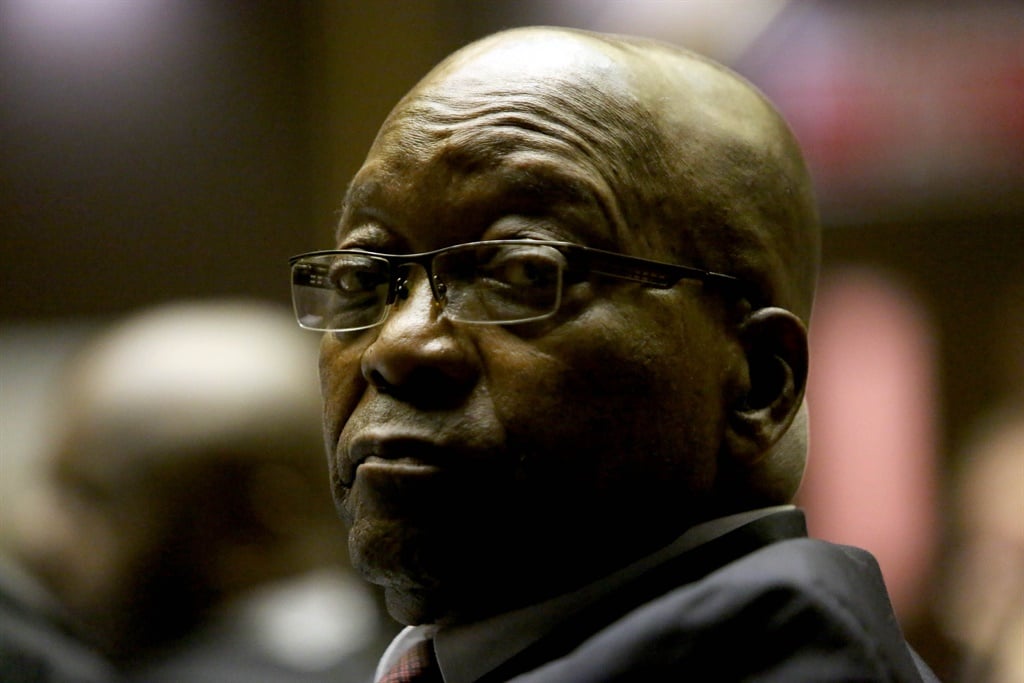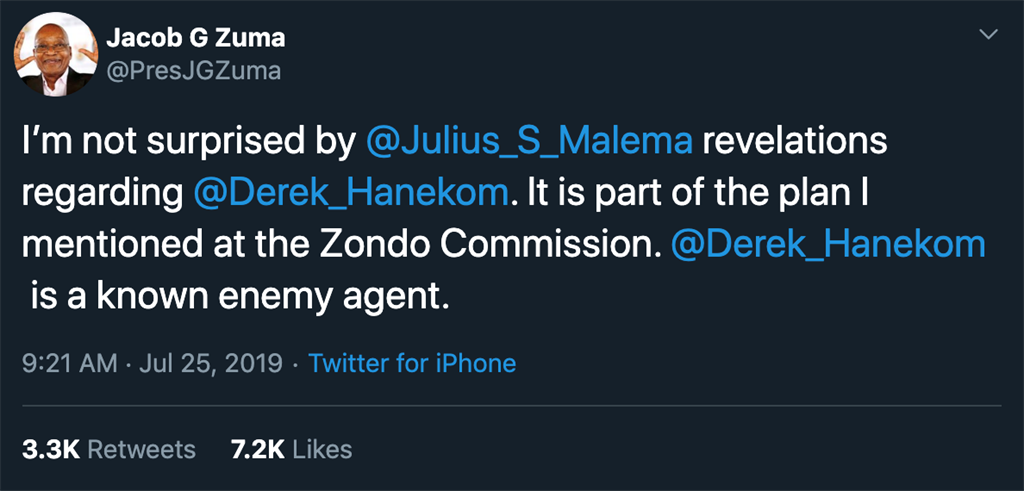


Former president Jacob Zuma is seen inside the Pietermaritzburg High Court.
Gallo Images/Thulie Dlamini
- Former president Jacob Zuma has filed papers in the Constitutional Court for leave to appeal a ruling that he defamed ANC veteran Derek Hanekom.
- In 2019, Zuma tweeted Hanekom was a well-known agent of the enemy.
- Hanekom took Zuma to court and demanded R500 000 in damages for defamation.
Former president Jacob Zuma has approached the Constitutional Court seeking leave to appeal a High Court ruling that he defamed ANC veteran Derek Hanekom.
Zuma’s newly appointed attorney, Eric Mabuza, filed the papers on Thursday, arguing there were reasonable prospects of success.
Mabuza said the court had failed to deal with the contention the former president’s Twitter comment enjoyed the protection of Section 16 of the Constitution.
In 2019, Zuma tweeted Hanekom was a well-known agent of the enemy. His tweet followed revelations Hanekom had met with the EFF to discuss a motion of no confidence in Zuma when he was the sitting president.
Hanekom sued Zuma to the tune of R500 000 for defamation following the tweet on 25 July 2019.
However in September 2019, the KwaZulu-Natal High Court ordered Zuma to apologise for the tweet and interdicted him from publishing any statement in the future that said or implied Hanekom was an enemy agent or apartheid spy.



Former President Jacob Zuma was taken to court for this tweet.
Screengrab
The court found the tweet was false and defamatory and ordered it be removed within 24 hours of the judgment being handed down.
READ: Jacob Zuma ordered to say sorry to Derek Hanekom over ‘known enemy agent’ tweet
The former president was also ordered to publish an apology on his Twitter account within 24 hours after the judgment was handed down.
Zuma then applied for leave to appeal the judgment, which was dismissed by Judge Dhaya Pillay in November 2019, on the basis there was no reasonable prospects of success before another court.
Dismissal
Following the dismissal for leave to appeal, Zuma then petitioned the Supreme Court of Appeal directly, but lost his appeal without it being heard.
In court papers filed in the Constitutional Court, Zuma’s lawyer said the court had jurisdiction to hear the appeal.
“The High Court disregarded the defence of truth, reasonable comment and the application of Section 16 of the Constitution that the statements made by Mr [Julius] Malema about Mr Hanekom conniving with the EFF to remove Mr Zuma as a sitting president are true and correct and that Mr Hanekom participated in the plan to remove him is true and correct,” Mabuza said.
He added what was concerning about the High Court order was it banned Zuma from “ever speaking about Mr Hanekom as an enemy agent or apartheid spy”.
“This is so despite the fact that in future Mr Zuma may well produce evidence to back up any claim he will make in the future.”
ALSO READ: Another loss for Zuma as court dismisses bid to appeal Hanekom defamation judgment
Mabuza said the High Court judge did not pay due regard to Section 16 of the Constitution which protected the former president’s right to freedom of expression.
“The High Court erred in finding that the statement posted in the tweet by Mr Zuma was not true and/or was false. The court seems to have been guided by Mr Hanekom’s own sensitivity to the use of the word enemy.”
Mabuza added the court erred in finding a reasonable reader would infer Zuma’s tweet implied Hanekom was or is an apartheid spy.
‘Far-fetched’
“This is simply far-fetched. There is no reason why conflicts or battle lines of more than a quarter of a century ago should be transposed into political debate in post-apartheid South Africa.”
He said no reasonable reader would interpret the statement referring to Hanekom as an enemy for plotting with the opposition party to refer to enemies of the ANC during apartheid.
“It has been demonstrated that the facts on which Mr Zuma was expressing his opinion were true or substantially true and relate to matters of public interest. His opinion was not based on or accentuated by malice.
“At the heart of the allegations is the dishonesty and duplicity of the respondent, as we have demonstrated, is completely true.”
Mabuza said: “It must then be asked whether the desire of the respondent was to be protected from the possible embarrassment of the disclosure of a fact which is now common cause, ie, that he collaborated with the EFF to remove Mr Zuma from office.”

